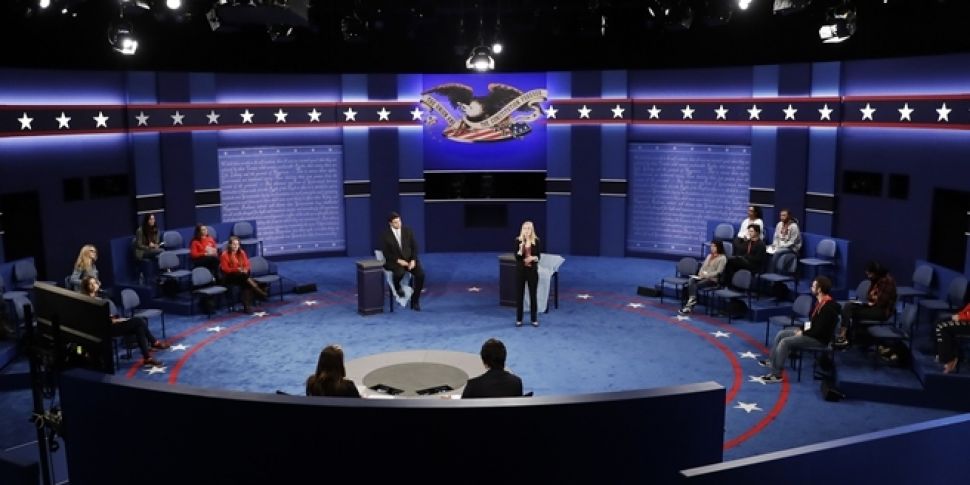Hillary Clinton and Donald Trump will meet on stage once again on Sunday in St. Louis as the second presidential debate takes place.
Washington University will host the debate, but unlike the first meeting between the two, Clinton and Trump will be given questions from not only the moderators - CNN's Anderson Cooper and Martha Raddatz of ABC News - but the audience in attendance as well.
That changes things significantly for the candidates and for those watching at home, who will see very different tactics from the Democratic and Republican candidates.
So, here are a few key things to watch out for on Sunday evening.
Signs of crisis
According to The New York Times, there were several people in the Trump camp in the wake of the first debate who stated that sitting the candidate down and focusing on the best way to hit back at his opponent proved to be a very difficult task. They were frustrated at the lack of preparation put in by Trump, and although he started strongly, the Republican candidate flailed quite badly in the latter stages and became erratic, missing the talking points that had been plotted out for him, and failing to hit the prepared shots that they felt would damage Clinton the most.
Despite all that, Trump claimed victory for himself on the night citing online polls, and later blamed any perceived weak moments on a problem with his microphone.
Video: @realDonaldTrump says Holt did "fine job," claims his mic was "defective" pic.twitter.com/dLpPgv55SU
— Mosheh Oinounou (@Mosheh) September 27, 2016
Reports suggest that inability to get through to the candidate has been a trend in this round of preparations as well, which have gotten off to a bad start. NBC News correspondent Katy Tur told podcast Keepin' it 1600 that his aides have been rebuffed when they attempt to give constructive feedback, and a recent town hall event in preparation for the new format went awry.
With everything that has happened since the leaked tape of comments made by Trump about women earlier this week, leading Republicans have started to step away from the GOP candidate. If there are further signs of crisis tonight, then expect to see more key figures trying to abandon a sinking ship.
Body language
Sunday night presents some new and interesting challenges for both candidates. Standing on stage behind a lectern means that they need to keep a strong focus on their facial expressions and reactions as their opponent speaks, with cameras trained on them from all angles.
In a town hall format, the ability to stand up and walk around presents a new dynamic, and while it might seem like a rather small thing, there are rules and norms that have long been observed at these events, and have cost candidates who failed to abide by them in the past.
When Al Gore famously stood up and walked towards George Bush during a town hall debate in the course of the 2000 election, the move backfired as the Republican candidate defused the tension with a simple nod of his head. The moment has since become an infamous gaffe for Gore, as the audience laughed off his attempts to intimidate Bush.
Bill Clinton's history
Towards the end of the first debate, Trump congratulated himself for not saying something "really rough" about Hillary Clinton and her family in response to the attack ads her campaign has been running against him.
However, appearing on a slate of Sunday shows today, Trump surrogate Rudy Giuliani seemed less sure that the "personal" issues wouldn't take centre-stage this time, and the GOP candidate already started to reference Bill Clinton's past in his taped apology for the remarks he made about women in a leaked recording from 2005.
Rudy Giuliani on whether Trump will attack Bill Clinton's past tonight: "Depends on how the debate goes." #ThisWeek https://t.co/DYXIoReRBr
— ABC News (@ABC) October 9, 2016
The reason Trump was convinced to steer clear of those topics in the first place was that polls showed Hillary Clinton proved to be more popular when the issues of infidelity were brought up, and they may well have the opposite effect to the one Trump is hoping for. If he does bring this up to distract attention from his own controversy, it may well be a sign that he is going against the wishes of many in his campaign team.
Sorry seems to be the hardest word
The stakes are incredibly high for Trump on Sunday; he badly needed a win coming into this debate, even before the news broke of his comments on Friday evening.
Trump took the rather rare step of issuing a full apology for his remarks in the wake of the leak, but he has since been keeping a very low profile (except for on Twitter).
Tremendous support (except for some Republican "leadership"). Thank you.
— Donald J. Trump (@realDonaldTrump) October 9, 2016
He will be pressed on that issue, and has already retweeted an interview with Juanita Broaddrick from Breitbart, indicating that he intends to go on the offensive in response to any criticism. How that will work out for him in a setting where he is faced with a non-partisan audience, moderators and his chief opponent in the race is a complete unknown.
Clinton targeted his record of offensive comments about women in the first debate, in particular those made about Rosie O'Donnell, and Trump stumbled badly, saying "she deserves it and no one feels sorry for her". Another incident like that would put the Republican candidate putting himself in a very weak place with voters heading into the final straight.
Fact-checking
The tricky business of fact-checking has become one of the biggest issues in this election cycle. In the first debate, Lester Holt was criticised by some for interjecting too often, and by others for not calling candidates out when they were bending the truth. The vice-presidential debate between Tim Kaine and Mike Pence faced similar criticisms.
Although Cooper and Raddatz are experienced journalists, the format of the town hall means they will need to press the candidates to answer the questions put to them, and fact-check them without seeming to favour one side or the other.
They are, however, in a tricky situation where many on social media view merely presenting a candidate with their own words as bias, and - more than perhaps in any previous election - the moderators will be scrutinised for how they maintain that ever-elusive sense of "balance."
If you're staying up to see it all unfold live on Sunday evening, here's a handy breakdown of where and when you can watch or listen to the debate.
You can stick with us here on Newstalk.com, as well as on @Newstalkfm on Twitter, for live coverage throughout the night as well as analysis afterwards.









